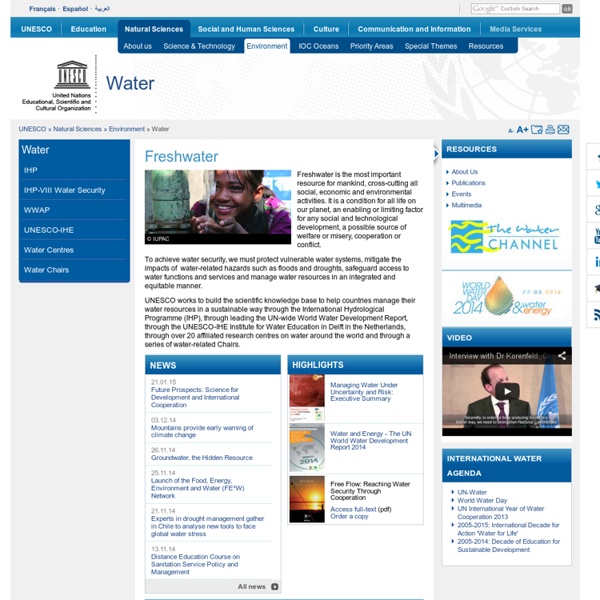About Us
The water and sanitation problem in the developing world is far too big for charity alone. We are driving the water sector for new solutions, new financing models, greater transparency, and real partnerships to create lasting change. Our vision: Safe water and the dignity of a toilet for all, in our lifetime. Co-founded by Gary White and Matt Damon, Water.org is a nonprofit organization that has transformed hundreds of communities in Africa, South Asia, and Central America by providing access to safe water and sanitation.
AQUASTAT - FAO's Information System on Water and Agriculture
Website updates 20/12/2016 - Since 2015, a section on "Women and irrigation" is added when updating country profiles. At present, already 53 out of the 147 country profiles available have such section included, which can be easily accessed through a dropdown menu from the "Water and gender" page. 30/11/2016 - Updated country profiles, maps and water and irrigation data are now available for an additional seven countries in Africa: Egypt, Ethiopia, Libya, Madagascar, Mozambique, Nigeria and United Republic of Tanzania. 10/11/2016 - To provide a quick overview of global, continental and regional values of some key variables and indicators, four summary tables showing global, continental and regional data on population, water resources, water use and irrigation have been updated. 10/08/2016 - To be able to enhance the service we provide to you, we would appreciate you taking 5 minutes of your time to respond to a quick AQUASTAT user survey.
Ofwat home page
WWAP
El Programa Mundial de Evaluación de los Recursos Hídricos de las Naciones Unidas, auspiciado y dirigido por la UNESCO, coordina la labor de 28 entidades asociadas y miembros de ONU-Agua en el Informe sobre el desarrollo de los recursos hídricos en el mundo (WWDR, por sus siglas en inglés). El principal informe de ONU-Agua es una reseña trienal que ofrece una visión fiable del estado, el uso y la gestión de los recursos de agua dulce del planeta. Además de coordinar este importante informe de la ONU, el WWAP supervisa las cuestiones relacionadas con el agua dulce para proporcionar recomendaciones, desarrollar estudios de casos, reforzar la capacidad de evaluación a escala nacional e informar sobre el amplio proceso de toma de decisiones en materia hídrica.
Global Initiatives
The world’s largest expanse of tropical rainforest – home to at least 10 per cent of the world’s known species and more than 30 million people – forms the focus of one of our ambitious initiatives. WWF has already played a unique role in conserving the Amazon over the past 40 years, developing scientific knowledge, experience, and key partnerships with local,regional, and international players. We have invested more than US$30 million in conservation in the region since 2001 and are working with the government of Brazil and other partners on the Amazon Region Protected Areas Programme (ARPA), which has already helped create more than 20 million hectares of protected areas since 2002. Building on this solid foundation, in 2007 we launched a ten-year Amazon Initiative to vastly scale up our efforts. Sufficient forest cover will also maintain regional rainfall and build resilience to climate change, ensuring a healthy Amazon that will continue to regulate both the regional and global climate.
Global Climate Change Center
Global climate change is a matter of intense concern and public importance. There can be little doubt that human beings influence the world's climate. At the same time, our knowledge of the extent, progress, mechanisms and results of global climate change is still incomplete. New data are becoming available every day - from tree rings to deep sea samples, ice cores, glacial changes and climatological models - while the greatest minds all over the world are working to better understand climate change and its impact on life on earth. Scientific understanding emerges through full consideration of relevant data, appropriate debate and the application of the scientific method. Thus, we urge all scientists and members of the public to engage in the global climate change discussion, including AccuWeather.com's experts.
Plans for COP21 in Paris - December 2015
Un message de Campaign against Climate Change (Campagne Contre le Changement Climatique) Nous arrivons à une croisée des chemins pour le climat. A travers le monde, de nombreux activistes ont commencé à se mobiliser autour de l’idée d’un “Seattle pour le climat”- un événement qui pourrait lancer un mouvement climatique mondial de la même manière que les manifestations à Seattle en décembre 1999 avaient déclenché une nouvelle résistance à travers le monde. Mais comment parvenir à un tel but?
Environmental Governance - United Nations Environment Programme
United Nations Environment Programme environment for development Environmental Governance The new InforMEA learning platform is now live. Start learning! Latest News



